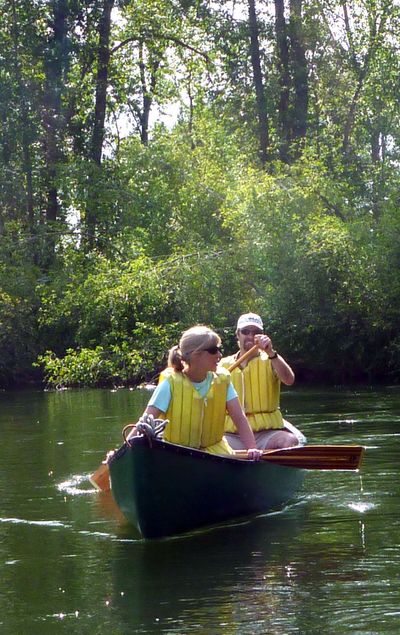Loss of functional Royalex puts canoe industry in flux

Lynn McAdams remembers his first crisis in canoe-making, back when he sold the boats on the banks of the Clark Fork River in Missoula.
“I got rid of everything I had when the first oil embargo came on, when the price of plastics and resins got really high,” McAdams said of the 1973 economic tailspin. “Short-term (bank loan) notes were 23 percent. I decided to stick with the aluminum canoes – Grummans mainly. Now almost all the canoes are made out of Royalex.”
And now Royalex is about to disappear. The material that revolutionized canoe-making back in the 1970s has lost its sole-source manufacturer. For the water sports world, it’s like the day Hostess announced there would be no more Twinkies. Royalex wasn’t perfect, but like the Twinkie, it was affordable, functional and everywhere.
“I don’t know how they’re going to make canoes that aren’t too heavy and not too expensive,” McAdams said.
Royalex was first produced in the 1970s by Uniroyal. It sandwiches layers of ABS plastic and foam between coverings of vinyl to make sheets that are heat-moldable, relatively lightweight, rigid and tough. Royalex had advantages over most every other material. It bounced off rocks better than wood or fiberglass, didn’t bend like aluminum, was cheaper than Kevlar or other fancy composites, and lighter and stronger than the plastics commonly used to mold kayaks.
Unfortunately, only canoe-makers liked the stuff. A company called Spartech made it in a single plant in Warsaw, Ind. When Spartech was bought out by international plastics company PolyOne last year, the new owner closed the factory. The last shipments of raw Royalex sheets went out in December.
“There’s nothing that really fits into that niche that Royalex had,” said John Anderson, boat buyer at The Trail Head in Missoula. “I know (canoe manufacturer) Mad River is working on finding other things, and other major manufacturers are scrambling to replace it. The prices for 2014 models are already going up about 30 percent.”
A new Royalex canoe costs about $1,400. A Kevlar or carbon-fiber boat would set you back more than $2,000. While plastic models can be had for around $800 or less, they usually require an internal frame or other reinforcement to match a Royalex boat’s durability.
Former canoe racer Mike Johnson recalled how his time as a boat delivery man funded his competitive travels. The retired Missoula teacher won many East Coast boat marathons in the 1980s.
“I’d pull a 10-boat trailer behind me when I’d go to the championships,” Johnson said. “I’d take it to Winona (Minn.) and drop the trailer at the Wenonah factory. When I’d come back, they’d have that trailer all loaded up for me.”
Johnson got to know Wenonah owner Mike Cichanowski. He also got to see how the canoes were made.
“They had these piles of those big sheets, long enough to make a boat,” Johnson said. “They’d heat the sheets in an oven, pull them out and lay them over a mold and suck it down. It seemed only a few minutes for that to take shape. Then a press on a cable would come down and cap the bottom part, and make it in the proper shape for a boat.”
Johnson would haul his loaded trailer to dealers between Minnesota and Montana, dropping off orders. Over the years, he switched to carbon-fiber boats for their speedy lightness, but still likes the Royalex models for their durability.
“They’re great for running rocky rivers,” Johnson said. “I don’t know where it will go from here. I’m pretty certain we’re not going to go back to metal. I suppose there’s a niche for somebody.”
Just as Twinkies made a comeback last summer under new management, maybe someone will revive Royalex production, too. Calls to PolyOne’s corporate headquarters were not returned.
And nothing spurs innovation like scarcity. Explorer David Thompson floated Rocky Mountain rivers during spring runoff, usually loaded with hundreds of pounds of beaver pelts, 200 years ago. His canoe material of choice? Birch bark.